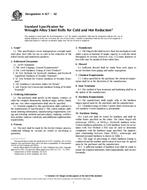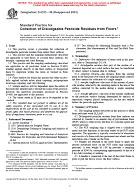1.1 This test method is applicable to materials that soften upon heating to a modulus less than 6.0 MPa. This test method describes the determination of the temperature at which the specific modulus of either 6.65 (Method A) or 33.3 MPa (Method B) (equivalent to Test Method D 1525) of a test specimen is realized by indentation measurement using a thermomechanical analyzer as the test specimen is heated. This temperature is identified as the indentation softening temperature. The test may be performed over the temperature range of ambient to 300C.
Note 1 – This test method is intended to provide results similar to those of Test Method D 1525 but is performed on a thermomechanical analyzer using a smaller diameter indenting probe. Equivalence of results to those obtained by Test Method D 1525 has been demonstrated on a limited number of materials. Until the user demonstrates equivalence, the results of this Test Method shall be considered to be independent and unrelated to those of Test Method D 1525.
1.2 This test method is not recommended for ethyl cellulose, poly (vinyl chloride), poly (vinylidene chloride) and other materials having a large measurement imprecision (see Test Method D 1525 and sections and ).
1.3 Electronic instrumentation or automated data analysis and reduction systems or treatments equivalent to this test method may be used.
Note 2 – Since all electronic data treatments are not equivalent, the user shall verify equivalency to this test method.
1.4 SI values are the standard.
1.5 There is no ISO standard equivalent to this test method.
1.6 This standard does not purport to address all of the safety concerns, if any, associated with its use. It is the responsibility of the user of this standard to establish appropriate safety and health practices and determine the applicability of regulatory limitations prior to use.
Product Details
- Published:
- 09/01/2005
- Number of Pages:
- 5
- File Size:
- 1 file , 100 KB
- Redline File Size:
- 2 files , 200 KB


